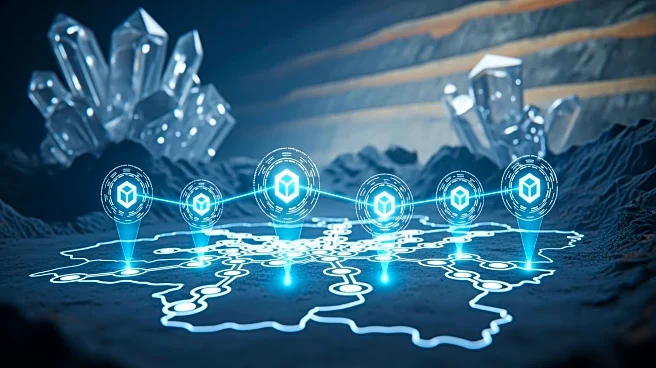What's Happening?
Blockchain technology is being utilized to improve traceability in the mining of minerals such as tin, tantalum, tungsten, and gold, which are often associated with conflict and unethical practices. The
technology allows for the creation of an authentic record of documentation for every step minerals take from mine to manufacturer. This process helps ensure that minerals are sourced responsibly, avoiding support for illegal and inhumane mining operations. Blockchain tools provide transparency by recording transactions and certifications, which can be accessed via QR codes attached to shipments. This initiative is part of a broader effort to address the social and environmental impacts of conventional mining practices.
Why It's Important?
The use of blockchain in mining is significant as it addresses the issue of 'conflict minerals,' which are often linked to human rights abuses and environmental degradation. By ensuring traceability, companies can avoid supporting exploitative practices and comply with international regulations such as those set by the OECD and the EU. This technology not only helps in maintaining ethical supply chains but also enhances buyer confidence, potentially leading to increased demand for responsibly sourced minerals. Furthermore, it supports the transition to clean energy by ensuring that the minerals used in technologies like solar panels and batteries are ethically sourced.
What's Next?
The adoption of blockchain technology in mining is expected to expand, with more companies implementing traceability solutions to meet regulatory requirements and consumer demand for ethical products. As blockchain tools become more integrated into mining operations, they may also facilitate better compliance with environmental and labor standards. The ongoing development of digital product passports could further enhance transparency and accountability in the supply chain, potentially leading to broader industry changes and increased pressure on non-compliant operations.
Beyond the Headlines
The integration of blockchain technology in mining could lead to long-term shifts in industry practices, promoting greater sustainability and ethical standards. It may also influence consumer behavior, as more individuals and companies prioritize products with verified ethical sourcing. Additionally, the technology could drive innovation in other sectors, as the principles of transparency and traceability become more widely adopted.









